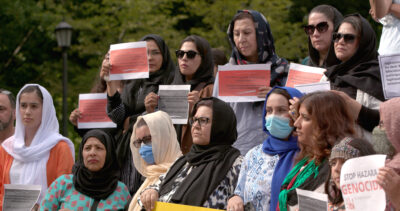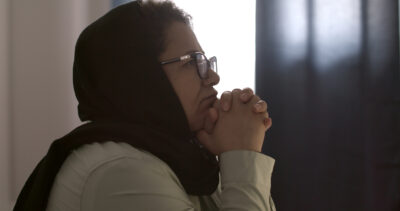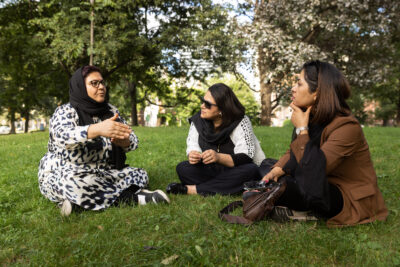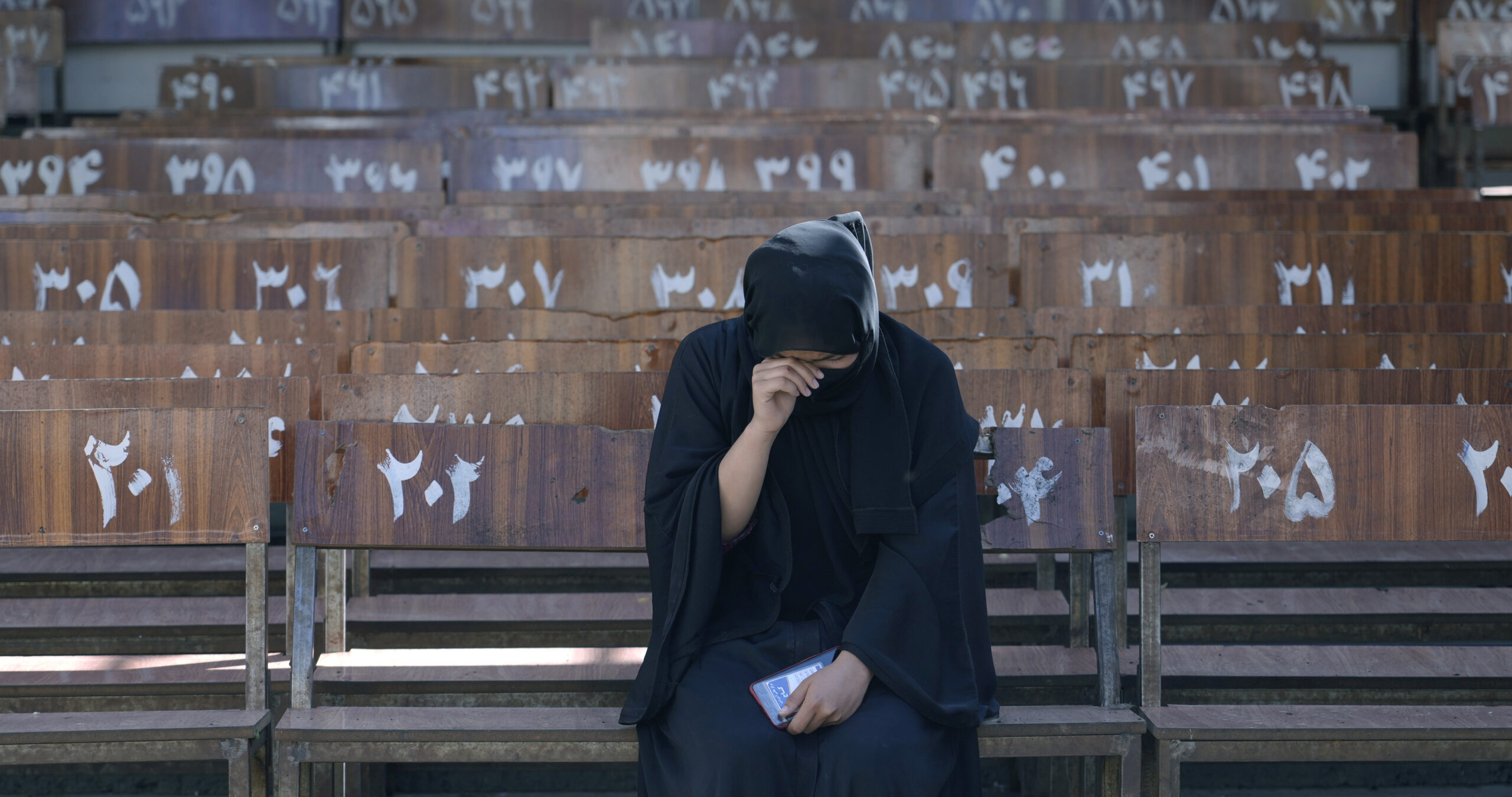In August, the Taliban imposed a new morality law that severely restricts the rights of Afghan women and girls. Women must cover their entire bodies and faces. They are prohibited from interacting with non-Muslims, using public transport alone, and looking at men to whom they are not related by blood or marriage.
This new law only furthers the oppressive power the Taliban has held in Afghanistan since 2021. 64 percent of Afghan women surveyed by UN Women say they do not feel safe leaving their homes alone. 8 percent report knowing at least one woman or girl who has attempted suicide since the Taliban’s takeover.
A powerful new documentary available on CBC and CBC Gem documents the harsh realities of these extensive limitations for women living in Afghanistan, and four leaders who are fighting for the international community to take action to restore their rights and freedoms.

An Unfinished Journey follows four women leaders—past parliamentarians, ministers and journalists—who were stripped of their positions and forced to flee their country when the Taliban took control in 2021. They reinvent themselves in Canada, beginning new lives while tirelessly advocating for women in Afghanistan from afar, struggling to keep the world’s attention on the grave situation in their home country.
One of these women is Nargis Nehan, a former minister in the Afghanistan Parliament. Now living in Toronto, Nargis connects women in Afghanistan with international policymakers, amplifying the voices of those directly impacted by the Taliban’s rule.
We sat down with Nargis and Aeyliya Husain, the award-winning co-director of An Unfinished Journey, to hear more about the crisis unfolding in Afghanistan, and what it could mean for women’s rights across the world.
The impetus for the film was the Taliban takeover in 2021, when they began to strip away rights for women and girls in Afghanistan. Aeyliya, can you take us back to that moment, and how that led you to make An Unfinished Journey?
Aeyliya Husain (AH): When I first heard the news, my heart just sank, because I knew immediately that life for women and girls was drastically going to change. I understood what the impact could be because the Taliban are far more restrictive in their approach to women’s rights. That was one impetus for me to make the film— the impact that this is going to have on the lives of women and girls there.
But also, this is a harbinger of things to come. We need to stop this. If we deteriorate women’s rights here, that gives other nations a carte blanche to do it as well. This is a very important global issue, not just an issue about what’s happening to Afghan women.
Nargis, can you tell us about your experience of being part of this documentary and sharing your story while navigating your new life in Canada?
Nargis Nehan (NN): It has not been an easy process. While continuously working and advocating for women’s rights in Afghanistan, and trying to stay strong, we’re also the victims of the situation. Many of us were forced to leave our country with a lot of uncertainty.
When Aeyliya reached out to me and talked about this documentary, I was busy day and night trying to find ways to amplify the voices of women from inside Afghanistan. But in the meantime, I was a newcomer myself in Canada. I was also struggling with my own documents, with a new life and a lot of new responsibilities in Canada. But I knew it was an important initiative—it was going to bring the lives and the struggles of Afghan women to the attention of the world. One thing that I really appreciate is there are so many women such as Aeyliya around the globe who have sympathy for us, and they want to use any skill that they have to amplify our voices.

Many Canadian viewers may not be aware of just how dire the situation is for Afghan women and girls. Aeyliya, what did you want to make sure came across about what is happening in Afghanistan?
AH: Nargis was able to connect us to Afghan women on the ground so we understood what was really happening to them. We wanted to show the impact of the restrictions by the Taliban on these women. Those meetings that Nargis has in the film, where the women are talking about how it is impacting them—you feel it. As a woman sitting here in Canada or the US, you understand that they’re completely deteriorating and taking away everything that these women have for no reason. It was really important to show how drastically their lives have changed. Some of these women were the sole breadwinners for their families. They were very accomplished.
It was really important for me to show that Afghan women are a force. Afghan women have been fighting for their rights for 100 years. There’s nothing new. They’ve been doing it for a long time, and so they have that long history of feminist activism, just like Canada and the US do.
An Unfinished Journey also addresses how the crisis in Afghanistan is an indicator of the fragile state of women’s rights everywhere. Can you expand on this and your message to women worldwide who watch the film?
NN: Do not take the freedom that you have for granted. There is a threat that is rapidly growing and expanding. And I’m afraid, God forbid, that a time will come when we will talk about restrictions on women in countries such as Canada.
Because it’s not only the Taliban. There’s an ideology that they’re following. With the approach that they have adopted in Afghanistan, they have changed the curriculum for the young boys, removing all social sciences, focusing on religious issues and brainwashing them with the most regressive form of Sharia law, which is a misrepresentation of Islam. After a few years, there are going to be millions of young people in Afghanistan who are brainwashed and intolerant of the freedom and equality that women are enjoying in the rest of the world. They feel the responsibility for “purifying” these societies the way, according to them, that they have purified Afghanistan.
Today it’s Afghanistan, but this ideology is not going to stay in Afghanistan. It is going to be expanded to the rest of the world. Education is really important so that we can understand what is at stake for us globally, so we can come together and address it.

The documentary will air on CBC. What do you think is most important for audiences in Canada who are watching An Unfinished Journey to take away?
NN: The resilience, resistance, and the leadership of Afghan women. We talk about women’s lives, we talk about women’s struggles. We are fighting for women’s rights, but we are also fighting for a democratic and inclusive government in Afghanistan that can manage all our diversities, including our gender diversity, and can provide a safe space for all of us to go back and rebuild our country. That is one important takeaway, that Afghan women are fighting back for their rights and the rights of all Afghans, the current generation as well as the future generation.
AH: What I want people to take away from this is that the entire world has come to Afghanistan at some point in the past 20-30 years. They meddled in their governments and their society and have left the Afghan people to pay the price. We need to stand up and have our politicians recognize that and actually make reparations to help them recover and get back on a democratic path.
We need to be vigilant of what’s happening in Afghanistan, because this is going to spread. We don’t have to look far. We can just look across the border. If Trump gets in, rights will be taken away, and the first people they will take from are women. So this is very, very serious. This is not an isolated case. This is a canary in the coal mine.
An Unfinished Journey airs on The Passionate Eye at 9 p.m. (9:30 NT) on October 16 on CBC, and will be available to stream on CBC Gem.




 Follow Us On Instagram
Follow Us On Instagram
